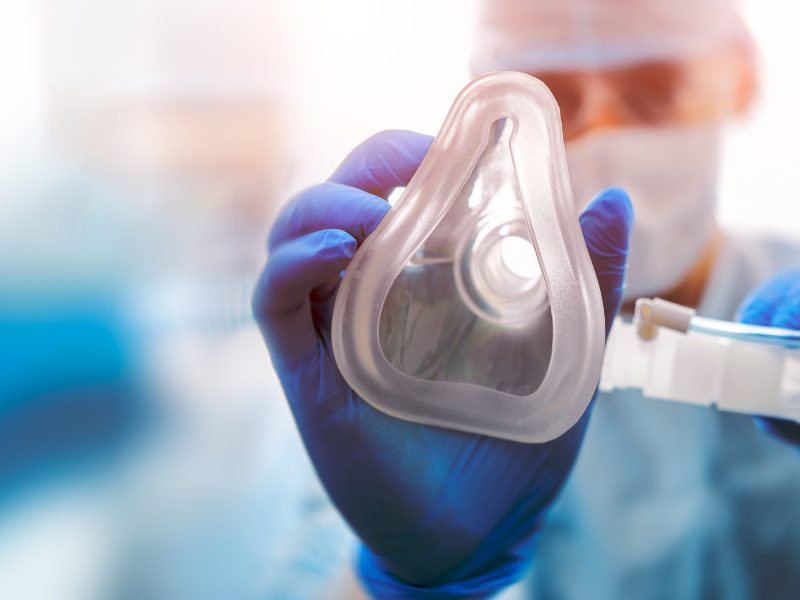Sleep Dentistry: A Game Changer for Tongue Interference During Dental Treatments
When the tongue gets in the way of dental procedures, it can be quite inconvenient and make an already stressful situation even more difficult. Pure Dentistry offers sleep dentistry for tongue interference through general anaesthesia to help patients experience a more peaceful dental visit. Sleep dentistry helps you rest peacefully while our Brisbane dentist works without any interruptions. It will make the entire experience smoother and more comfortable both for you and the dentist. Imagine going to sleep, waking up without any of the typical discomfort, and the treatment already completed.
Why Tongue Interference Can Be a Problem During Dental Treatment
Tongue interference happens when the tongue gets in the way during procedures and can make it challenging for the dentist to do their job effectively. It’s a common issue that can lead to longer procedures and more discomfort for the patient. The tongue’s constant movement can make it difficult for the dentist to see or reach particular parts of the patient’s mouth.
Tongue interference can slow things down and make the experience more inconvenient and stressful. For people who are already feeling nervous about going to the dentist, dealing with tongue interference can make the whole visit even more challenging.
Specific Situations Where Managing Tongue Interference Is Important
Managing tongue interference during dental procedures is really important to make sure everything goes smoothly and safely.
Here are some situations where managing tongue interference really matters:
Cavity Fillings
When you are getting a cavity filled, the dentist needs a clear view of your tooth. If your tongue gets in the way, it can make things tricky and lead to an extended period of time in the chair. Keeping your tongue still helps the dentist do their job quickly and keeps you more comfortable.
Tooth Extractions
Getting a tooth pulled especially wisdom teeth, can be stressful. Your tongue naturally wants to explore, but that can make the procedure harder and even risky. By managing your tongue, the dentist can work safely, helping you get through it with less worry.
Root Canals
Root canals can be nerve-wracking, and the last thing you want is for something to go wrong. If your tongue moves around, it can interfere with the delicate work the dentist is doing. Keeping it out of the way helps ensure the procedure goes smoothly and with as little discomfort as possible.
Orthodontic Work (Braces)
When you’re getting braces, every little adjustment counts. If your tongue is moving around, it can make the process longer and more uncomfortable. Proper tongue management means the orthodontist can fit everything just right, saving you time and discomfort.
Dental Impressions
Getting moulds taken for crowns or night guards can be uncomfortable. If your tongue moves, it can mess up the mould, meaning you might have to do it all over again. Keeping your tongue still helps ensure the impression is accurate, so you don’t have to go through that hassle.

How Sleep Dentistry Can Help Manage Tongue Interference During Dental Treatments
Using sleep dentistry can significantly help in managing tongue interference during dental procedures.
Here’s how it helps:
Prevents Tongue Movement
When you’re under general anaesthesia, your body is completely relaxed, including your tongue. When the patient’s body is relaxed, the dentist can work without worrying about the tongue getting in the way. This can lead to a smoother and more efficient procedure.
Reduces Anxiety and Stress
Dental visits can be stressful for some people, especially if they have had bad experiences in the past. Sleep dentistry can take away that worry. The patient will be asleep during the entire procedure and won’t feel nervous about their tongue or anything else.
Improves Precision and Safety
When the patient’s tongue is not in the way, the dentist can focus entirely on the procedure they are performing. This precision reduces the risk of accidental injury and ensures that the treatment is done accurately and safely.
Shortens Treatment Time
Without the tongue moving around, the dentist will not be interrupted and can, therefore, work faster. This means the patient will spend less time in the dental chair, which can make the experience more convenient.
Enhances Overall Comfort
When the patient is asleep during the dental procedure, they won’t feel the usual discomfort or pressure that comes with dental treatments. They will wake up with the dental work already done without having to deal with the stress of the procedure itself.
Who Might Need Sleep Dentistry?
Sleep dentistry can be beneficial for a lot of people, including those who find dental appointments scary or stressful. Below, you can find some common reasons why a person may benefit from sleep dentistry:
Dental Anxiety
Sleep dentistry offers a solution to people who are nervous or scared about going to the dentist to get through dental treatments without worry or stress. It is a relief to know that you can sleep through the dental procedure and avoid the anxiety that comes with being awake.
Strong Gag Reflex
Having a sensitive gag reflex can make even a simple dental check-up into an uncomfortable experience. Sleep dentistry allows you to be completely relaxed so that the dentist can work without triggering that reflex.
Difficulty Keeping the Mouth Open
Some people have difficulty keeping their mouths open for long periods, which makes dental treatments difficult. With sleep dentistry, the patient is asleep and relaxed, and their mouth can stay open naturally, making the procedure smoother for both you and the dentist.
Complex or Lengthy Procedures
If you need a longer or more complicated treatment, like getting your wisdom teeth removed or having major dental work done, sleep dentistry can make it a lot easier. Instead of being awake and uncomfortable during the whole procedure, you can just relax and wake up when it’s all finished.
Special Needs
For some people with physical or cognitive challenges, staying calm or cooperating during dental visits can be difficult. Sleep dentistry helps them get the care they need without any extra stress or discomfort.

Is Sleep Dentistry Safe?
Sleep dentistry is generally very safe, especially when an experienced team administers it. Here’s what you should know:
- General Anaesthesia Safety: While general anaesthesia might sound a bit scary, it’s actually quite safe when managed by professionals. Anaesthetists are highly trained, will monitor you closely, and ensure everything goes smoothly during the procedure.
- What to Expect: During the procedure, you’ll be completely asleep, so you won’t feel or remember anything. After you wake up, you might feel a bit groggy, but this usually wears off quickly. Most people feel normal within a few hours.
- Experienced Care Matters: It is important to choose a dentist and anaesthetist with experience in sleep dentistry. The dentist’s expertise ensures that the procedure is as safe and comfortable as possible and gives you peace of mind throughout the process.
What to Expect During the Procedure
Here’s what you can expect during a sleep dentistry procedure:
Before the Procedure
First, your dentist will explain everything to you and ensure that you understand what’s going to happen. Then, the anaesthetist will gently put you to sleep using a safe, carefully measured dose of anaesthesia. You’ll drift off to sleep quickly and won’t feel anything during the procedure.
During the Procedure
While you’re asleep, the dentist and their team will work on your teeth. They’ll be extra careful to make sure everything goes smoothly. The anaesthetist will stay by your side the whole time, keeping a close eye on your breathing and heart rate to ensure you’re safe.
Waking Up
After the procedure is done, you’ll slowly wake up in a comfortable, quiet room. You might feel a bit sleepy or groggy, but that is normal. The dental team will be there to check on you and make sure you’re feeling okay before you leave.
After the Procedure
Once you’re fully awake, you can go home, but you’ll need someone to drive you since you might still feel a bit dizzy. Most people feel back to normal after a few hours, but it’s a good idea to take it easy for the rest of the day.
Recovery and Aftercare Tips
It is normal to feel a bit groggy as you wake up after a sleep dentistry procedure, but this should pass within a few hours. Here’s what to expect and some simple tips to help with your recovery at home:
Immediate Aftercare
Once the procedure is finished, you’ll rest in a comfortable spot until you are fully awake. It’s a good idea to have someone with you, as you might feel a little unsteady on your feet at first. The dental team will make sure you’re okay before you head home.
Rest
When you get home, take it easy for the rest of the day. It is a good idea to relax and avoid doing anything too strenuous. It’s normal to feel a bit tired, so give your body the time it needs to recover.
Eating and Drinking
Start with soft foods and plenty of water. Avoid hot drinks or anything too crunchy for a day or so. Your mouth might be a bit tender, so gentle foods like soup, yoghurt, or mashed potatoes can be comforting.
Pain and Discomfort
You might feel some mild discomfort once the anaesthesia wears off. Over-the-counter pain relief can help if needed. If anything feels more painful than expected, don’t hesitate to contact your dentist.
When to Call Your Dentist
If you notice anything unusual, like excessive swelling, bleeding, or intense pain that doesn’t go away, reach out to your dentist.

Frequently Asked Questions
We have asked our Brisbane dentist some of the most common questions our patients ask regarding tongue interference during dental treatments.
What is tongue interference during a dental visit?
Tongue interference is when your tongue gets in the way during a dental procedure. It’s something that happens naturally, as your tongue might move without you even realising it.
Why does my tongue interfere during dental procedures?
Your tongue is naturally curious and wants to explore what’s happening in your mouth. It can also react to the feeling of tools or even a bit of nervousness.
Is tongue interference common during dental procedures?
Yes, it’s very common. Most people experience it, and dentists are used to working around it.
How do dentists manage tongue interference?
We use gentle tools like a tongue retractor or ask you to relax your tongue. We’re always careful to keep you comfortable while we work.
Can tongue interference affect the outcome of my dental treatment?
In most cases, it doesn’t cause any problems. We’re skilled at managing it so that your treatment goes smoothly. If the issue is preventing us from continuing the procedure, we’ll think of other viable options rather than just asking you to relax your tongue.
What can I do to minimise tongue interference during my dental visit?
The best thing you can do is try to relax. Trust that we’re taking care of everything, and focus on breathing calmly through your nose.
Should I be concerned if my dentist uses a tongue retractor?
Not at all. A tongue retractor is just a tool we use to gently hold your tongue out of the way. It helps us work more efficiently and safely.
What happens if I accidentally move my tongue during a procedure?
Don’t worry. If it happens, we’ll simply pause and gently reposition your tongue. We deal with this all the time.
Is it normal to feel nervous about tongue interference?
Yes, it’s completely normal to feel a bit nervous. We understand, and we’re here to help make the experience as comfortable as possible.
Can tongue interference cause injury during dental procedures?
It’s very unlikely. We’re always careful and aware of your tongue’s position, so the risk of injury is extremely low.